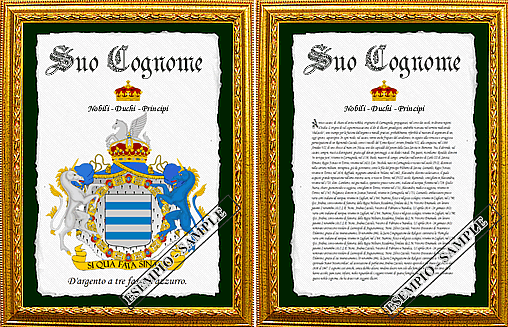Falace is specific to the inhabitants of Caserta, SantʻArpino and Castellammare di Stabia in the Neapolitan dialect, Fallace is typically from the Campania region of Naples and Fragneto Monforte in the Benevento area. Fallaci is typically Tuscan from Florence, Farace has a Campanian stock in Anacapri, Naples and Herculaneum in the Neapolitan and in Salerno, and a Cosentino lineage in Santa Maria del cedro, Verbicaro and Orsomarso, should derive from the nickname later become medieval name Fallax, Fallacis of which we have an example in "... Tetbaldus, dictus Fallax vel Tricator, comes Carnotensis ... ". additions provided by Fabio Paolucci anticipation from his Reasoned Dictionary of the Sannio Surnames being published Falace - Fallace - Fallaci - Farace Falace is a typically Campania surname, prevalent mainly in the Caserta area, in the municipalities of Sant'Arpino, Orta di Atella and Gricignano di Aversa, in the Neapolitan area of Castellammare di Stabia and in the same Neapolitan capital, with offshoots also in the Salerno area. Fallace, a variant of Falace, is present in Naples and Benevento, where it is recorded with greater intensity in the municipality of Fragneto Monforte. Different would seem to be the origin for the pluralized form Fallaci, probably to be traced back to the same etymology of Falace and Fallace, but attested only in Tuscany, Florence, where it probably originated, and in the Aretino, as well as in Emilia Romagna in Bologna and in the municipality of Casalecchio di Reno. From the etymological point of view, it is possible to conjecture different hypotheses of derivation for the surnames Falace, Fallace and Fallaci. In the first analysis, we could consider the Latin verb fallere (deceive), and therefore the derivatives falli (to be deceived, deceived), fallax, acis (fallacious, deceitful, fraudulent, hypocritical, deceitful) and fallacy, ae (deceit, fraud, intrigue, trap). A second interpretation would move us to consider a possible connection with the Greek term fallos, meaning "virile member", as a basis of derivation for a staff of Greek origin created with the function of propitiating virility and fecundity, by virtue of the ancient phallic cults left for centuries rites of an apotropaic nature still practiced in rural communities until the early Middle Ages and, in the countryside of Southern Italy, up to very recent times. The derivation from the Latin word fala (or phala, ae) is less probable, which could indicate both a wooden tower used in the ancient sieges, and one of the seven columns that, planted on the "spine" of the circus, were used to count the number of the riders' laps. Still, to be taken into consideration is a possible connection with the Germanic word Fara: the definition "Farae, hoc est generationes" used by Paolo Diacono in his Historia Langobardorum to indicate the noble or parental-family groups in which it was divided his people, consisting of families and individuals descended from a common progenitor or aggregated on the basis of conventional constraints, aimed at creating relationships similar to those of the agnatians. The Longobard Farae were real political-military organisms, and over time the name is assumed to also indicate the territory inhabited by the group, giving rise to numerous toponyms such as Fara d'Adda, Fara in Sabina, Fara Filiorum Petri, etc ., derived precisely from the allocation of ancient Longobard peoples in these places. Reasoning in this sense, it is possible to conjecture a derivation of the cognominal forms taken into consideration by the term Fara, transformed into Farace, and therefore also into Falace, Fallace and Fallaci. A safer orientation would lead instead to consider the surnames Falace, Fallace and Fallaci as originating from the cognomal form Farace, widespread in Italy in multiple localizable nuclei in Lazio in Rome, in Calabria in Cosentino (in the municipalities of Santa Maria del Cedro, Verbicaro, Orsomarso and Scalea), in Campania between Neapolitan and Salernitan (Anacapri, Salerno, Naples, Herculaneum, Capri and Portici, in order of diffusion) and in Sicily where it is present in the spot of leopard, as well as in the central and northern areas of the Peninsula due to the effect of migratory flows originated from the South, especially since the 1950s. The surname Farace, from the etymological point of view, would seem to be the result of a phenomenon of surname in a patronymic sense of a staff of Italic, Greek or, more probably, Greek-Arab origin. This hypothesis seems to be corroborated by the attestation in antiquity, in the areas of Southern Italy, of personalities such as the Greek Phalaecus (Faleco), which was also the name of the famous Greek poet who gave birth to the endecasillabo falecio, the Italian Falacer, cris (Falacre), name of a mythical Italic hero, one of the 15 flamini (according to Varrone, "flamen Falacer a divo patre Falacre") and the Arabic and Greek Faras, precisely translated as Farace. The Faras staff would seem to be at the origin of the Farace surname: Faras is still a name of an Arab person of Greek Hellenistic origin, and the term faras in the Arabic language assumes the meaning of "horse".
Buy a heraldic document with your coat of arms
You may be interested
 Nobles: Italia
Nobles: Italia Verba Volant, Scripta Manent
